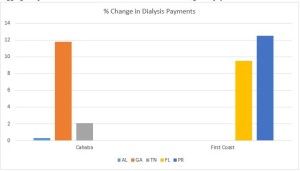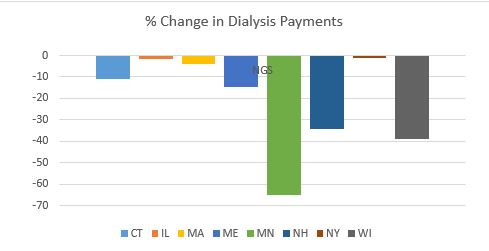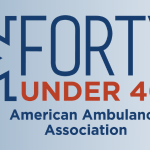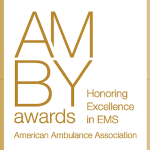Tag: Tennessee
2022 Annual Conference Speakers Wanted!
Written by AAA Staff on . Posted in AAA HQ, Annual Conference & Tradeshow.
2022 Annual Conference Speakers Wanted!
Written by AAA Staff on . Posted in AAA HQ, Annual Conference & Tradeshow.
Federal Court Enjoins the Federal Contractor Vaccine Mandates in KY, OH, TN
Written by Scott Moore on . Posted in Judicial, Operations, Patient Care, Professional Standards, Regulatory.
40 Under 40: Amanda Shell Jennings (Priority Ambulance – Knoxville, TN)
Written by American Ambulance Association on . Posted in 40 Under 40.
40 Under 40 nominees were selected based on their contributions to the American Ambulance Association, their employer, state ambulance association, other professional associations, and/or the EMS profession.
____
Amanda Shell Jennings
Director of Marketing and Communications
Priority Ambulance
Knoxville, Tennessee
____
LinkedIn
Nominated by: Dennis Rowe
____
Biography:
As Director of Marketing and Communications, Amanda Shell Jennings manages internal and external communications throughout the Priority Ambulance family of companies.
Jennings provided marketing and public relations support for the company since its founding in 2014 in her previous role as Senior Account Executive with public relations firm Moxley Carmichael. Prior to joining Priority Ambulance, Jennings was a top performing account executive at premier East Tennessee public relations firm Moxley Carmichael for five years, where she created and executed strategic communications plans for Priority Ambulance, Tennessee Theatre, Knoxville Convention Center, Knoxville Civic Auditorium and Coliseum, US Nitrogen, and Knoxville’s Community Development Corporation, among other clients. Jennings specializes in media relations, event planning, marketing, crisis communications, internal communications, and social media strategy.
Jennings is involved in local professional organizations. Jennings currently serves on the Communications Committee for the American Ambulance Association and as Treasurer of the Volunteer Chapter of the Public Relations Society of America. Jennings served as Vice President of collegiate relations for the Knoxville American Marketing Association from 2012 to 2015. Jennings holds a Bachelor’s Degree in Journalism with a minor in Spanish from the University of Tennessee, Knoxville.
____
Reason for Nomination:
As the Director of Marketing and Communications, Amanda Shell Jennings brings members of the Priority Ambulance family of companies in states across the country closer together through communication strategies and tells the story of Priority Ambulance and its personnel to the industry and the public.
As part of an outside consultant group, Amanda developed and guided the initial brand strategy for the company’s founding in 2013. Joining the company’s marketing and growth department full-time in 2017, Jennings has managed the announcements and brand integrations of eight acquisitions and three cold startups.
Beginning with 150 employees in two locations to a current total of nearly 3,000 employees in 10 states, Amanda has developed communications programs, tools, and strategies to bring the family of companies closer together. In 2018, the company launched a company wide Priority News Network with mounted screens at each Priority location that share company news, employee profiles, clinical updates and alerts, and more in a cloud-based network. Jennings and the corporate marketing team work with subject matter experts throughout the company to develop news items, updates, and recognitions.
Jennings also supports the external marketing and new business development efforts at each Priority company, including leading the proposal development process for hospital and 9-1-1 contracts. Jennings has been sharing the stories of EMS in the media for eight years and finds the most enjoyment from telling the human stories of EMS and sharing the positive impact that the Priority team has on patients and communities.
In addition to her work at Priority Ambulance, Jennings volunteers for the Priority Ambulance Leadership Foundation, a 501c3 nonprofit envisioned and founded by former owners of Priority Ambulance’s companies to develop the next generation of EMS industry leaders. The foundation organizes a year-long, accelerated EMS executive course with four week-long in-person class sessions. Jennings assisted in launching the leadership course in 2019 and serves as the chair of the fundraising committee and manages the annual capstone project. The foundation graduated its first class of six in 2019 and has expanded to a class of 12 for 2020.
Jennings also currently serves on the Communications Committee for the American Ambulance Association.
____
View all of the 2020 Mobile Healthcare 40 Under 40 Honorees
40 Under 40: William Pitt (Puckett EMS – Chattanooga, TN)
Written by American Ambulance Association on . Posted in 40 Under 40.
40 Under 40 nominees were selected based on their contributions to the American Ambulance Association, their employer, state ambulance association, other professional associations, and/or the EMS profession.
____
William Pitt
Vice President of O perations, Southeast Tennessee/Northwest Georgia
perations, Southeast Tennessee/Northwest Georgia
Puckett EMS (Member of the Priority Ambulance family of companies)
Chattanooga, TN
____
LinkedIn
Nominated by: Amanda Jennings (Priority Ambulance – Knoxville, TN)
____
Biography:
Will Pitt has more than 15 years of experience in the emergency medical service field. As Vice President of Operations, Pitt oversees a 250-person team serving 10 hospitals and five counties with 9-1-1 service in Southeast Tennessee and Northwest Georgia for Puckett EMS.
During Pitt’s time at Puckett EMS, the service has seen a 40 percent increase in service volume in his region. Pitt has also been instrumental in the design and launch of the Puckett EMS Training Academy, the largest initial education program in the region. The academy provides annual opportunities for EMT, EMT-Advanced, and Paramedic certification training to the region.
Prior to his work at Puckett, Pitt spent seven years at Walker County Fire and Emergency Services where he advanced from the field to senior management ultimately serving as the Chief of EMS. During his tenure, Pitt created a quality improvement and education division that included initial education programs from EMTs and paramedics.
Pitt has also been involved in local professional organizations. Pitt has served as the Chairman for the Georgia Region I EMS Council and Treasurer for the Southeast EMS Director’s Association. Additionally, Pitt has been a board member of the Northwest Georgia EMS Systems and the Southeast Tennessee Regional MedComm Committee.
Pitt has received numerous awards, including being named the Georgia Association of EMS Statewide Educator of the Year in 2015.
Pitt holds a Master’s Degree in Business Administration from Columbia Southern University and a Bachelor’s Degree in Biological Anthropology and Anatomy from Duke University.
____
Reason for Nomination:
Throughout every step of his career, Will Pitt has advanced the EMS industry in the region by developing and structuring educational opportunities and recruiting new individuals to EMS.
Recognizing a need for EMS education and training in the region, Will launched a partnership between Puckett EMS and Faithful Guardian Training Center to create the Puckett EMS Training Academy. The Academy provides annual EMT and paramedic level certification courses multiple times a year and is the largest provider of initial certification training in the region.
In the Northwest Georgia and Southeast Tennessee, like many locations in the United States, the pipeline of new professionals entering the EMS industry has been trending downward. In response to this, Pitt launched an accelerated 8-week EMT-Basic class that is completely free to the students and provides a training wage so that students can be in training full-time. By removing some of the financial barriers to beginning a career in EMS, the response to the course has been overwhelming. The academy has already graduated its first class and is currently training its second class. Additionally, Pitt is in the process of developing a program in conjunction with local high schools to provide EMT training to seniors as part of a work-based learning program.
Pitt volunteers his time in regional industry leadership having served as Chairman for the Georgia Region I EMS Council and Treasurer for the Southeast EMS Director’s Association. Pitt is actively involved in fostering collaboration across EMS agencies to improve public health and service in the region.
In 2014, Pitt was part of the group of state officials and leaders that developed the state’s first Disaster Assistance Response Task Force, which provides an organized framework and standardized education for disaster response in North Georgia. This project provides a mechanism by which the EMS leadership in a county experiencing a disaster situation can immediately mobilize dozens of ambulances and hundreds of personnel to address large-scale emergencies.
____
View all of the 2020 Mobile Healthcare 40 Under 40 Honorees
2018 AMBY Award Winners Announced
Written by Jessica Marvin on . Posted in AMBY, Annual Conference & Tradeshow, Awards, Events, Press.
The American Ambulance Association is proud to announce the recipients of the 2018 AMBY Awards. The AMBYs highlight excellence in EMS and the ingenuity and entrepreneurial spirit that epitomize AAA members. The mission of the awards is to showcase creativity and innovation in the ambulance industry by fostering a culture of collaboration, cooperation and a passion for excellence in patient care. This year’s awards will be presented at the Annual Conference & Trade Show Awards Reception on September 7, 2018. Please join us in congratulating our 2018 winners!
Clinical Outcome Program
Medic Ambulance Service, Inc. | Vallejo, CA
Community Impact Program
NorthStar EMS, Inc. | Tuscaloosa, AL
Employee Programs
Hall Ambulance Service, Inc. | Bakersfield, CA
Innovation in EMS
Priority Ambulance | Knoxville, TN
Mercy Ambulance Service, Inc. | Savannah, GA
Public Relations Campaign
MEDIC EMS Agency | Charlotte, NC
Hall Ambulance Service, Inc. | Bakersfield, CA
Quality Improvement Program
Sunstar Paramedics | Largo, FL
Patient and Employee Safety Program
Priority Ambulance | Knoxville, TN
Once again, join us in celebrating the 2018 winners! Learn more about the AMBYs.
REPLICA Compact Enacted
Written by Suzanne Prentiss on . Posted in News, Press, Professional Standards.
REPLICA Meets Goal, Interstate Compact Becomes Official
May 8, 2017
For Immediate Release
Contact:
Sue Prentiss
603-381-9195
prentiss@emsreplica.org
May 8, 2017 (Falls Church, VA). With the 10th member state enactment, the Recognition of
Emergency Medical Services Licensure Interstate Compact (REPLICA) has become official.
Governor Nathan Deal of Georgia signed Senate Bill 109 on today activating the nation’s first EMS
licensure compact. States that have passed REPLICA to date include: Colorado, Texas, Kansas,
Virginia, Tennessee, Idaho, Utah, Mississippi, Wyoming and Georgia.
Released in 2014, REPLICA’s model legislation creates a formal pathway for the licensed individual
to provide pre-hospital care across state lines under authorized circumstances. According to Keith
Wages, president of the National Association of State EMS Officials (NASEMSO), “REPLICA
represents a collective, nationwide effort to address the problems faced by responders when needing
to cross state borders in the line of their duties.” Wages highlighted the compact’s abilities to
“increase access to healthcare, reduce regulatory barriers for EMS responders, and place an
umbrella of quality over cross border practice not previously seen in the EMS profession.” Wages
also noted that the partnership with the National Registry of Emergency Medical Technicians
(NREMT) has been essential during the advocacy and implementation phases. “We are grateful for
their continued support and contributions.”
Through funding provided by the Department of Homeland Security (DHS), NASEMSO led 23 EMS,
fire, law enforcement organizations and associations as well as key federal partners in the design and
drafting of REPLICA. The National Registry of EMTs (NREMT) currently provides funding to finalize
the development of the Commission.
The compact calls for establishment of an Interstate Commission with each state that has passed
REPLICA holding a seat, as well as a national EMS personnel coordinated database. Member states
will be able to rapidly share personnel licensure information, develop policy focused only on cross
border EMS practice, and hold EMS personnel originating in other states accountable in an
unprecedented way. The National Registry of EMT’s (NREMT) has committed to the development
and hosting of the coordinated database.
Twelve national associations and organizations support REPLICA. Three states have REPLICA bills
under consideration in their legislative sessions. Learn more at www.emsreplica.org.
###
House Holds Hearing on Veterans Choice Program
Written by Todd Tuten on . Posted in Government Affairs, Legislative, News, Veterans Affairs.
The House VA Committee hearing started at 7:30 p.m., but it was well-attended and lasted until 10 p.m. The witnesses included Senator John McCain (R-AZ), VA Secretary David Shulkin, and representatives of the VA Office of Inspector General and the Government Accountability Office. Senator McCain and Secretary Shulkin were both warmly welcomed by Members of the Committee on a bipartisan basis.
Chairman Roe (R-TN) emphasized the need to act quickly to extend the authorization for the Veterans Choice Program, which expires on August 7. To that end, the House VA Committee is voting today on a bill to eliminate the sunset of the program’s authorization. In addition, the Committee will consider broader legislation later this year to make comprehensive reforms to the Choice Program. He noted that the VA has additional funds available but will not be able to spend them once the authorization expires. A copy of Chairman Roe’s opening statement is available here.
Secretary Shulkin testified in support of extending the Choice Program, and he clarified that the VA was not seeking additional funding – just the authority to spend funds already obligated. He noted that the VA already is being forced to deny Choice Program coverage to veterans whose episodes of care would extend beyond the August 7 expiration date (e.g., pregnancy).
Secretary Shulkin also urged Congress to support the VA’s efforts to bring appointment scheduling in-house for care coordination purposes. However, the VA OIG witness noted challenges in records going out to community-based providers and coming back to the VA. The GAO witness also underscored the need for the VA to have better systems in place in order to effectively coordinate care, which will take time to procure and implement. Rep. Brownley (D-CA) echoed that point, calling the VA’s information technology systems a “Model T in a Tesla world.” Rep. Esty (D-CT) also urged improvements in the VA’s information systems and expressed concern that veterans are being improperly billed.
Other Members, including Rep. Wenstrup (R-OH) and Rep. Poliquin (R-ME), raised concerns about continuing delays in the processing of claims and payments to providers. Secretary Shulkin agreed that providers deserve to be paid for their services, noting his own experience as a physician in the private sector. He acknowledged that the VA is not processing enough claims electronically today, and he advised that he plans to pursue options outside the VA for systems procurement going forward.
Many Members also raised serious concerns about treatment of PTSD and mental health conditions for veterans, including Rep. Wenstrup (R-OH), Rep. O’Rourke (D-TX), Rep. Sablan (D-MP), Rep. Banks (R-IN), Rep. Rutherford (R-FL) and Rep. Takano (D-CA). Rep. O’Rourke emphasized that suicide among veterans is the most serious crisis, and Secretary Shulkin agreed that it is his number one priority. The Secretary announced that the VA will begin providing urgent mental health care that also will include individuals other than those service members who were honorably discharged. He added that the VA needs 1,000 more mental health providers, as well as telemental health services, and is looking to expand community partnerships to address suicide.
Rep. Banks noted interest among Indiana veterans in greater access to alternative treatments for PTSD and traumatic brain injury. Secretary Shulkin underscored that he is “most concerned about areas like PTSD, where we do not have effective treatments.” He also advised that the VA has established an “Office of Compassionate Innovation” (separate from the VA’s Center for Innovation), which will focus on finding new approaches to health and physical wellness and explore alternative treatment options for veterans when traditional methods fall short.
Rep. Wenstrup inquired about the VA’s GME and residency programs, as well as its associations with academic institutions. Secretary Shulkin responded that the VA is “doubling down” on partnerships with academic medical institutions.
Chairman Roe concluded his remarks by emphasizing the need to extend the Choice Program authorization soon and to consolidate the VA’s community-based care programs. He also expressed support for the VA’s decision to stop developing its own information technology internally.
2015 Medicare Data Shows Evident of Crackdown on Non-Emergency Transport
Written by Brian Werfel on . Posted in Medicaid, Medicare, Reimbursement, Talking Medicare.
2015 Medicare Payment Data Offers Evidence of Nationwide Crackdown on Non-Emergency Ground Ambulance Transportation; Impact Varies Dramatically by Medicare Administrative Contractor
Every year, CMS releases data on aggregate Medicare payments for the preceding year. This file is referred to as the Physician/Supplier Procedure Master File (PSP Master File). This past month, CMS released the 2016 PSP Master File, which contains information on all Part B and DME claims processed through the Medicare Common Working File with 2015 dates of service.
In September’s blog post, I discussed the results of the first year of the prior authorization demonstration project for repetitive, scheduled non-emergency ground ambulance transports. During this first year, the project was limited to three states: New Jersey, Pennsylvania, and South Carolina. The data confirms that these three states saw a dramatic reduction in Medicare’s approved payments for dialysis transports.
This month, I will be discussing the national payment trends for non-emergency ground ambulance transports, and, in particular, Basic Life Support non-emergencies.
In 2015, Medicare paid approximately $990 million for BLS non-emergency transports. This is 13% less than what it paid for BLS non-emergency transports in 2014 ($1.14 billion). Please note that these figures only reflect payments for the base rate; when the payments for the associated mileage are included, the reduction is even more dramatic.
In actual terms, this means Medicare Administrative Contractors (MACs) approved nearly 1 million fewer BLS non-emergency transports in 2015 (5.86 million) than they approved in 2014 (6.81 million). Roughly 75% of this reduction can be directly attributed to the prior authorization program in the three states listed above. Note: the reduction in approved dialysis transports in New Jersey accounts for nearly half of the national decline). However, that leaves nearly 250,000 fewer approved transports in the remaining 47 states. This reduction was not the result of fewer claims being submitted in 2015; the number of submitted claims was actually higher in 2015 than 2014. Rather, the data shows that this reduction is the result of the MACs actively denying many more claims than in year’s past.
I believe these reductions are the direct result of a step-up in the enforcement activities of the MACs, which I also believe has the tacit, if not outright, approval of CMS.
To test this thesis, I looked at the state-by-state data to see if any trends could be found. What I found was that 28 states saw increases in the total number of approved BLS non-emergency transports in 2015, with 19 states seeing decreases. However, on its face, that number is somewhat deceiving. The states that saw increases tended: (1) to see either relatively small increases or (2) had relatively low utilization rates to begin with. The states that saw decreases tended to be larger states with higher utilization rates, and those decreases tended to be larger in percentage terms. For instance, California saw a 21.5% decrease in the number of approved BLS non-emergency transports. Ohio saw an 11.7% decrease.
Digging deeper, it becomes clear that a state’s overall change in payments for BLS non-emergencies is almost perfectly correlated with its change in payments for dialysis transports. In other words, to the extent the state saw an overall reduction in payments for BLS non-emergencies, that reduction – – in nearly all cases – – was the result of the total payments for dialysis decreasing by more than any offsetting increase in the total payments for non-dialysis transports.
These relative changes in dialysis were also highly correlated with the MAC that administers Medicare claims in that state. To the extent your state saw a reduction in dialysis payments, it is highly likely that neighboring states administered by the same MAC saw similar reductions in payments. The following charts will help illustrate this point:
 As you can see, all three states within Cahaba’s jurisdiction saw a net increase in the total payments for dialysis. While the increases themselves were quite minor in Alabama and Tennessee, Georgia saw an 11.8% increase in total payments for dialysis. Similarly, both Florida and Puerto Rico saw significant increases in the approved payments for dialysis.
As you can see, all three states within Cahaba’s jurisdiction saw a net increase in the total payments for dialysis. While the increases themselves were quite minor in Alabama and Tennessee, Georgia saw an 11.8% increase in total payments for dialysis. Similarly, both Florida and Puerto Rico saw significant increases in the approved payments for dialysis.
By contrast, every state in National Government Services’ (NGS’) jurisdiction with more than 1,000 paid dialysis transports in 2015 saw a net reduction in the total payments for dialysis. These reductions ranged from a relatively minor reduction of 1.17% in New York to a nearly two-thirds (64.58%) reduction in Minnesota.
 This trend was present in all remaining jurisdictions, although the results were more mixed. For example, with the exception of South Carolina, the three remaining states administered by Palmetto all saw increases. Likewise, the majority of states administered by WPS saw decreases. This included Indiana, which has a sizeable dialysis population. Among WPS states, only Missouri saw a small (3.90%) increase.
This trend was present in all remaining jurisdictions, although the results were more mixed. For example, with the exception of South Carolina, the three remaining states administered by Palmetto all saw increases. Likewise, the majority of states administered by WPS saw decreases. This included Indiana, which has a sizeable dialysis population. Among WPS states, only Missouri saw a small (3.90%) increase.
California saw a 31.76% decrease in its payments for dialysis. The only other Noridian states with more than 1,000 paid dialysis trips were Hawaii and Washington, which both saw increases.
Novitas presents a more complicated picture, with several large states, such as Texas, seeing double-digit increases in payments for dialysis, while other large states saw sizeable decreases.
All in all, the data suggests that CMS and its contractors continue to pay close attention to the non-emergency side of our business, particularly BLS non-emergency transports. These transports have been under scrutiny for many years, as reports from the Office of Inspector General, the Government Accountability Office and other federal agencies have flagged this portion of our industry as being particularly prone to overutilization (and, in some cases, outright fraud). However, this heightened scrutiny is not being uniformly applied across-the-board. The data suggests that certain MACs have been far more aggressive in targeting these sorts of trips across their entire jurisdictions, while others seem content to target specific (typically large) states within their jurisdictions. This could serve as a template for how MACs will approach prior authorization in their jurisdictions.
‘Praemonitus, Praemunitus’
Latin Proverb, loosely translated to “forewarned is forearmed.”





